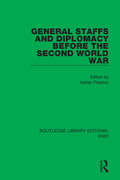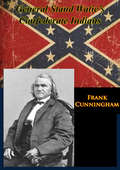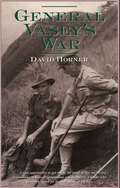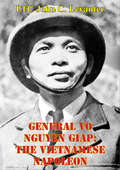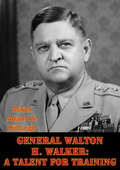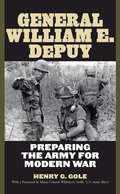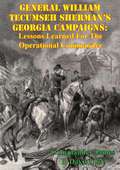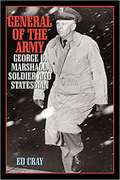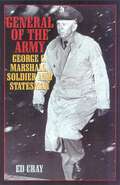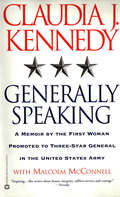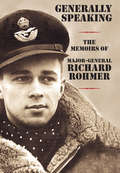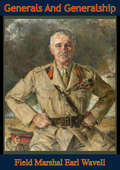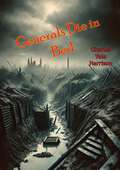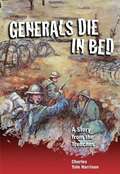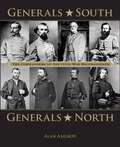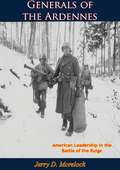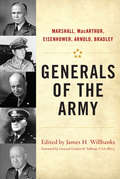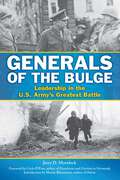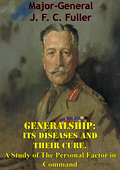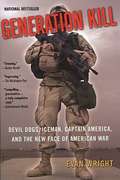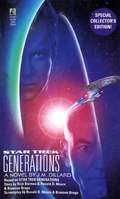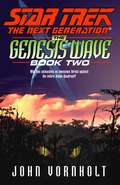- Table View
- List View
General Staffs and Diplomacy before the Second World War (Routledge Library Editions: WW2 #10)
by Adrian PrestonThis book, first published in 1978, examines the influence of the General Staffs upon the diplomacy of appeasement and rearmament between 1931 and 1941. The great question of European security and order, and their breakdown and the outbreak of the second world war, are examined here through the eyes of Cabinets and Foreign Offices as well as through the eyes of Chiefs of Staff.
General Stand Watie’s Confederate Indians
by Frank CunninghamThis is the story of Stand Watie, the only Indian to attain the rank of general in the Confederate Army. An aristocratic, prosperous slaveholding planter and leader of the Cherokee mixed bloods, Watie was recruited in Indian Territory by Albert Pike to fight the Union forces on the western front. He organized the First Cherokee Rifles on July 29, 1861, and was commissioned a colonel. In 1864, after battling at Wilson's Creek and Pea Ridge, he became brigadier general. Watie was the last Confederate general to lay down his arms in surrender, two months after Appomattox."Frank Cunningham tells with all its gusto, hard riding, triumph, and heartbreak, the story of Stand Watie's Cherokee Brigade that fought mightily in Missouri, Arkansas, and the present Oklahoma, under Generals Sterling Price, Thomas C. Hindman, Kirby Smith, and other commanders of the Trans-Mississippi Department, and when no superior officer was available, then pell mell and uncompromisingly on its own."--North Carolina Historical Review"A graphic and authentic account of General Stand Watie and his Indian troops....[It] fills a long-neglected gap in the Civil War annals."--Civil War History
General Vasey's War
by David HornerTo his troops he was 'Bloody George', a hard-bitten professional soldier, technically competent and tactically proficient. His brigade bore the brunt of the fighting in Greece. He commanded the entire Australian force in Crete in the battle against German airborne invaders. He directed the Australian advance from Kokoda and presided over the defeat of the Japanese in the savage battles of the beachheads. But there was more to Major-General George Vasey than his impressive record. Through the existence of a remarkable collection of letters to his wife, Jessie, we have a rare opportunity to get inside the mind of this successful commander. The picture that emerges is one that his closest comrades knew—one of compassion and humanity, a commander who genuinely cared for the well-being of his men. General Vasey's War analyses Vasey's military performance but it also allows us to share Vasey's private thoughts— his frustrations and triumphs, his hopes and cares. Through a unique insight into one man's war we are rewarded with a better understanding of the practice of warfare during those momentous years.
General Vo Nguyen Giap: The Vietnamese Napoleon
by LTC John C. LevanterGeneral Giap is undoubtedly one of the foremost practitioners of insurgency and revolutionary war. He has been called by some, the Vietnamese Napoleon. The issue is: What are the factors which have gained him such a reputation? What experiences have influenced his life and caused him to develop the strategy and tactics used the past 25 years in Vietnam? An extensive literature search was made to trace his life's history and to determine what factors have caused him to be as he is. The study examined his early life, civilian education, and use within the Vietnamese Communist Party, military training and experience. No effort was made to give a detailed analysis of any campaign or battle. A final evaluation was made that although his contribution on to the two wars in Indochina was great, evidence does not support placing him with such men as Mao, Guderian, or Napoleon. He has contributed little which is new to strategic or tactical principle & but rather has demonstrated the ability to apply well those principles developed by others.
General Walton H. Walker: A Talent For Training
by Major Adam W. HilburghA study of General Walton H. Walker's career offers a lens through which to view the evolution of Army training doctrine, revealing its strengths and weaknesses over a period of nearly four decades. However, an understanding of the skills necessary to train units for combat cannot consist solely of a review of training doctrine. General Walker's career provides valuable insights into the real-world challenges a leader experienced training an Army unit, both in war and in peacetime. The resource constraints, political realities, and physical hardships that make Army training so difficult to accomplish with skill and foresight cannot be gleaned from classroom lectures or the pages of a journal or doctrinal publication. Further, an analysis of the breakout and pursuit Walker's XX Corps executed in Normandy, and later the performance of the Eighth Army during the first weeks of combat in Korea, reveal how General Walker applied contemporary training principles to develop combat formations that performed exceptionally well in combat. Finally, a review of current training principles demonstrates that Walker emphasized the same principles throughout his career that retain primacy in today's Army. This reveals Walker's lasting legacy: in addition to performing among the best of the Army's commanders in combat, Walker set himself apart as one of the leading trainers in U.S. Army history.
General William E. DePuy: Preparing the Army for Modern War (American Warriors Series)
by Henry G. GoleThis &“excellent biography&” of one of the US Army&’s unsung heroes &“provides a much-needed re-examination of the early post-Vietnam Army" (Bowling Green Daily News). By the 1970s, the United States Army was demoralized by the outcome of the Vietnam War and shifting attitudes at home. The institution as a whole needed to be reorganized and reinvigorated—and General William E. DePuy was the man for the job. In 1973, DePuy was appointed commander of the newly established Training and Doctrine Command (TRADOC). By integrating training, doctrine, combat developments, and management in the US Army, he cultivated a military force prepared to fight and win in modern war. General William E. DuPuy is the first full-length biography of this key figure in American military history. With extensive interviews with those who knew DePuy, as well as access to his personal papers, Henry G. Gole chronicles and analyzes his unique contributions to the Army and nation. Gole guides the reader from DePuy's boyhood and college days in South Dakota through the major events and achievements of his life. During World War II, DePuy served in the 357th Infantry Regiment in Europe from the Normandy invasion until 1945, when he was stationed in Czechoslovakia. DePuy was asked by George Patton to serve as his aide; he supervised clandestine operations in China; he was instrumental in establishing Special Forces in Vietnam; and he briefed President Lyndon B. Johnson in the White House. But his finest contribution was fixing a broken Army.
General William Tecumseh Sherman's Georgia Campaigns: Lessons Learned For The Operational Commander
by Commander James P. DavisBetween May and December 1864, General William Tecumseh Sherman conducted two highly successful campaigns through Georgia, seizing Atlanta and Savannah and inflicting significant damage on Confederate military resources. Sherman’s operations were founded in thorough logistics planning, skillful movement and maneuver of a light, mobile force, and bold movement behind enemy lines without a fixed line of communications. This paper will examine and analyze General Sherman’s use of operational art, focusing on the operational factors of space, time and force and the operational functions of command and control, logistics, movement and maneuver and protection. The analysis will provide lessons learned for today’s operational commander, including applicability to the concept of Operational Maneuver from the Sea (OMFTS).Sherman’s campaigns skillfully blended the advantages of terrain and mobility with maneuver, maintaining the initiative and freedom of action. Current defense initiatives point toward a leaner force, with the ability to respond to crises quickly with minimal logistic support. In future conflicts, U.S. forces may not have the luxury of secure bases of operations or a lengthy period to build up supplies prior to the commencement of hostilities. Sherman emphasized maneuver, mobility and logistical self-sustainment to the maximum extent possible. Success in future conflicts may depend on the ability of joint forces to operate very much like Sherman did in 1864.
General of the Army: George C. Marshall, Soldier and Statesman
by Ed CrayAs the U.S. Army's Chief of Staff through World War II, George Catlett Marshall (1880-1959) organized the military mobilization of unprecedented numbers of Americans and decisively shaped the Allied strategy that defeated first Nazi Germany, then Imperial Japan. As President Truman's Secretary of State, and later as his Secretary of Defense during the Korean War, Marshall the statesman created the European Recovery Act (known as the Marshall Plan), made possible the Berlin Airlift, and was awarded the Nobel Peace Prize. This masterful biography brings the reader face to face with a genuine American hero.
General of the Army: George C. Marshall, Soldier and Statesman
by Ed CrayAs the U.S. Army's Chief of staff through World War II, George Catlett marshall (1880-1959) organized the military mobilization of unprecedented number of Americans and shaped the Allied strategy that defeated first Nazi Germany, then Imperial Japan. As President Truman's Secretary of State, and later as his Secretary of Defence during the Korean War, Marshall the statesman created the European Recovery Act (known as the Marshall Plan) and made possible the Berlin Airlift. Ed Cray in this masterful biography brings us face-to-face with a genuine American hero and the winner of the Nobel Peace Prize.
General of the Dead Army
by Derek Coltman Ismail KadareThe story is about an Italian and a German general, both of whom have been sent to Albania twenty years after the war to dig up the remains of their dead soldiers and return them for burial in their native land. This is a most unlikely happening, for the Communist government is deeply suspicious of all foreigners, potentially spies, let alone two generals. The book, however, alternates between fiction and authenticity.
Generally Speaking: A Memoir by the First Woman Promoted to Three-star General in the United States Army
by Claudia J. KennedyWhen Claudia Kennedy retired from the United States Army in June 2000, she had made history by becoming the Army's first woman three-star general. The highest-ranking female officer of her time, she was Deputy Chief of Staff for Intelligence, overseeing 45,000 soldiers worldwide. Now a military analyst for NBC News, General Kennedy describes her thirty-two-year career, which spanned a time of monumental transformation for the military. She tells how -- just after the Army began to allow women officers to command men -- she was placed in charge of a rebellious, out-of-control company where she restored order and respect. She shows us the daunting challenges she faced over the years, from the DMZ in South Korea to the offices of the Pentagon. And she reveals how one of our most revered and misunderstood institutions really operates...as we meet a superlative leader who both witnessed groundbreaking changes in the Army and helped make them.
Generally Speaking: The Memoirs of Major-General Richard Rohmer
by Richard RohmerLieutenant-General Richard Rohmer is arguably Canada’s most decorated citizen. A commander of the Order of Military Merit and an Officer of the Order of Canada, his career began in World War II where he earned the reputation as one of Canada’s top Mustang reconnaissance pilots. For his service, which includes flying over the beaches of Normandy on D-Day, he received the Distinguished Flying Cross. A lawyer, litigator, journalist and best-selling author of 28 fiction and non-fiction books, Rohmer has met with such public figure as Queen Elizabeth, General George Patton, "Intrepid" Sir William Stephenson, Presidents Eisenhower, Regan, and Clinton, and has flown with John F. Kennedy. He is currently a member of the board of directors of Hollinger Inc. Recently, he chaired the 60th anniversary of the D-Day Advisory Committee to the Minister of Veterans Affairs. His autobiography, Generally Speaking: The Memoirs of Richard Rohmer, is written with Rohmer’s characteristic frankness and insight.
Generals And Generalship
by Field-Marshal Earl Wavell Field Marshal Sir John DillField Marshal Wavell was one of the most successful British Army commanders of the Second World War, often given the toughest assignments, usually greatly outnumbered and with few resources. In this short volume he shares the distilled wisdom on the qualities, mental, moral and political that are necessary for successful leadership.A long forgotten classic of military thought and leadership."These lectures by General Wavell [...] show very clearly how he and the army under his direction have gained their great victories in Africa and why they will gain others. For these lectures, though delivered over two years ago, could only have been delivered by a man capable of winning and keeping the confidence of all men in all walks of life. They deal with the relationships between man and man, on which must be founded both the success of an army and the success of a whole nation at war. I am glad indeed to think that they will have a wide audience, and particularly among soldiers, for whom they have deep lessons."--From Foreword by Field Marshal John Dill
Generals Die in Bed: 100th Anniversary Of World War I Special Edition
by Charles Yale HarrisonGenerals Die in Bed by Charles Yale Harrison is a harrowing and unflinchingly realistic portrayal of the brutal realities of trench warfare during World War I. Drawing on his own experiences as a soldier, Harrison delivers a powerful anti-war narrative that strips away the romanticism often associated with war, revealing the raw and devastating impact of combat on the ordinary soldiers who fight and die on the front lines.Set in the muddy, blood-soaked trenches of the Western Front, Generals Die in Bed follows a young, unnamed Canadian soldier as he endures the relentless horrors of war. Through his eyes, readers are confronted with the grim realities of life in the trenches—constant danger, crushing fatigue, the omnipresent threat of death, and the profound sense of disillusionment that permeates the ranks. Harrison’s writing is stark and unsentimental, capturing the futility and senselessness of a conflict that destroys lives without meaning or purpose.The title, Generals Die in Bed, serves as a bitter commentary on the disconnect between the front-line soldiers and the generals who command them from a distance, often safe from the carnage that their decisions create. Harrison’s narrative challenges the glorification of military leadership, exposing the tragic irony that while soldiers face unimaginable hardships and often die anonymously in the mud, the generals who direct the battles are spared the physical and emotional toll of combat.This book is a timeless and essential read for anyone interested in the human cost of war. Harrison’s Generals Die in Bed stands alongside other classic works of World War I literature, such as All Quiet on the Western Front, as a searing indictment of the horrors of war and a tribute to the soldiers who, despite everything, endure.With its vivid descriptions and haunting insights, Generals Die in Bed remains a poignant and powerful reminder of the true nature of warfare, making it a significant contribution to the literature of the Great War.
Generals Die in Bed: A Story from the Trenches
by Charles Yale HarrisonGenerals die in bed, while soldiers die in the trenches, horrifically, unimaginably, infested with lice and surrounded by rats fattened on corpses. There are no rules, no expectations in war. And there is certainly no glamour. Instead, the men inhabit a senseless world, trusting only the instinct to stay alive. Based on his own experiences in the First World War, Charles Yale Harrison writes a stark and poignant story from the point of view of a young man sent to fight on the Western Front. Beginning in Montreal, the scene soon shifts from the cheering crowds, streamers, and music of the farewell parade to the stench of the trenches, where the soldiers meticulously divide up the stale, gray "war" bread and rationed sugar for their weak tea. In stark, graphic detail, Harrison writes of the soldiers' fear as the crumbling dirt walls of the palisade tumble down upon them during a shell attack. He recounts the horror of face-to-face combat, where the enemy is revealed to be a smooth-skinned lad, no different from the boy down the street. He shows compassion for both the killer and the killed, each innocent, in a situation without choice. In raw, powerful prose, the insanity of war is shown clearly as Harrison questions the meaning of heroism, of truth, and of good and evil. The First World War may seem distant and irrelevant to many young people today, but it is a timeless and important lesson. Seen through the eyes of the adolescent narrator, the experience of trench warfare takes on renewed vibrancy as readers identify with the plight of the youthful soldiers. Harrison's vivid account is a valuable resource for all teachers and students of history and of the human condition. An introduction places Generals Die In Bed in its proper literary context, beside All Quiet on the Western Front and A Farewell to Arms. Harrison's concise, blunt writing style is an effective means of conveying the reality of war and an example to students of literature. Originally published in 1930, this book was lauded as "the best of the war books" by the New York Evening Standard.
Generals South, Generals North: The Commanders of the Civil War Reconsidered
by Alan AxelrodWith April 12, 2011, set to mark the 150th anniversary of the start of the Civil War at Fort Sumter, the time is ripe for a new assessment of the conflict&’s most influential and controversial military leaders. Generals South, Generals North highlights twenty-four such commanders—twelve each from the Confederacy and the Union. Best-selling author and military historian Alan Axelrod presents a biography of each, narrates the major engagements in which each fought (emphasizing tactical leadership and outcome produced), and explores each man&’s ever-controversial reputation. His consequent rankings are based on both historical and modern-day sources. Each profile is accompanied by callout quotations, photographs of the general, additional illustrations such as battle depictions, and a map depicting either a major engagement or the general&’s movements throughout the war. The result is an ideal quick reference for Civil War buffs and a beautiful addition to the library of general readers that is sure to start as many arguments as it settles.
Generals in the Making: How Marshall, Eisenhower, Patton, and Their Peers Became the Commanders Who Won World War II
by Benjamin RunkleShakespeare famously wrote that some men are born great, some achieve greatness, and some have greatness thrust upon them. Part military history and part group biography, Generals in the Making tells the amazing true story of how George Marshall, Dwight Eisenhower, Douglas MacArthur, George Patton, and their peers became the greatest generation of senior commanders in military history.As the U.S. Army&’s triumphant homecoming from World War I was quickly forgotten amidst two decades filled with economic depression and growing isolationism, Marshall, Eisenhower, MacArthur, Patton, Omar Bradley, Lucian Truscott, Matthew Ridgway, and their brothers in arms toiled in a profession most Americans viewed with distrust. Before they became legends, these young officers served their country in posts from Washington D.C. to Panama, from West Point to war-torn China. They taught and studied together in the Army&’s schools, attempting to innovate in an era of shrinking budgets, obsolete equipment, and skeletal forces. Beyond these professional challenges, they endured shattering personal tragedies: the sudden deaths of children or spouses, divorce, depression, and court martial. Yet when the world faced possibly its darkest hour, as fascism and barbarism were on the march, they stood ready to lead America&’s young men in the fight for civilization. By the end of World War II, even German commanders expressed amazement at the dynamic change in American military leadership since the Great War.Generals in the Making is the first comprehensive history of America&’s World War II generals between the wars, an invaluable prequel to every history of that war.
Generals of the Ardennes: American Leadership in the Battle of the Bulge
by Jerry D. MorelockIn the many decades since the German army smashed into the American lines in the Battle of the Bulge, opinion of the U.S. senior command's leadership capabilities has fluctuated between hero worship and scorn, with the latter view becoming more predominant as the initial glow of victory faded. Rather than a conventional study of the Ardennes offensive, "Generals of the Ardennes: American Leadership in the Battle of the Bulge" studies five examples of American command leadership at different levels to answer two questions: what characteristics of leadership did these generals display, and how did they affect the overall battle? Based on extensive documentation and personal interviews with participants, "Generals of the Ardennes" provides a description and analysis of: Dwight Eisenhower's role as coalition commander; Omar Bradley's direction of the 12th Army Group during the crisis; Lieutenant General William Simpson's contribution to the Ninth Army's part in defeating the German onslaught; Major General Troy Middleton's stand with the VIII Corps in the center of the fighting; Major General Alan Jones and Brigadier General Bruce Clarke and how they dealt with the challenges and confusions at "the point of the spear." Amid the countless books in many languages that tell and retell the history of the Battle of the Bulge, this one is unique in its focus on American generalship during those epic and decisive weeks that turned the tide of World War II in Europe. For that reason, it stands as both a significant history and an important document for the study of command and control.
Generals of the Army: Marshall, MacArthur, Eisenhower, Arnold, Bradley (American Warriors Series)
by James H. Willbanks&“A concise account of the extraordinary careers of the five men who had perhaps the greatest impact on the US military of the late twentieth century.&” —Andrew Wiest, author of The Boys of &’67: Charlie Company&’s War in Vietnam Formally titled &“General of the Army,&” the five-star general is the highest possible rank awarded in the U.S. Army in modern times and has been awarded to only five men in the nation&’s history: George C. Marshall, Douglas MacArthur, Dwight D. Eisenhower, Henry H. Arnold, and Omar N. Bradley. In addition to their rank, these distinguished soldiers all shared the experience of serving or studying at Fort Leavenworth, Kansas, where they gained the knowledge that would prepare them for command during World War II and the Korean War. In Generals of the Army, James H. Willbanks assembles top military historians to examine the connection between the institution and the success of these exceptional men. Historically known as the &“intellectual center of the Army,&” Fort Leavenworth is the oldest active Army post west of Washington, D.C., and one of the most important military installations in the United States. Though there are many biographies of the five-star generals, this innovative study offers a fresh perspective by illuminating the ways in which these legendary figures influenced and were influenced by Leavenworth. This concise volume offers an intriguing look at the lives of these remarkable men and the contributions they made to the defense of the nation. &“An excellent review of the lives and challenges, on and off the battlefield, during trying times for our country.&” —Ike Skelton, Former Chairman, House Armed Services Committee, US Congress
Generals of the Bulge: Leadership in the U.S. Army's Greatest Battle
by Jerry D. MorelockThe Battle of the Bulge lives in history as the U.S. Army's largest and bloodiest battle of World War II. This innovative study of American military leadership in action during the battle examines the performance of six generals in the days and weeks after the German attack in December 1944.
Generalship: Its Diseases and Their Cure. A Study of The Personal Factor in Command
by Major-General J. F. C. FullerThe seminal treatise on Generalship, by Major-General Fuller, reputed to have been the most formative book in General Patton's military training which he kept with him at all times."IN the summer of 1921 I was lunching at the Restaurant la Rue with the Deputy Chief of the French General staff when he told me the following story:At the battle of Waterloo, Colonel Clement, an infantry commander, fought with the most conspicuous bravery; but unfortunately was shot through the head. Napoleon, hearing of his gallantry and misfortune, gave instructions for him to be carried into a farm where Larrey the surgeon-general was operating.One glance convinced Larrey that his case was desperate, so taking up a saw he removed the top of his skull and placed his brains on the table.Just as he had finished, in rushed an aide-de-camp, shouting: 'Is General Clement here?'Clement, hearing him, sat up and exclaimed: 'No! but Colonel Clement is.''Oh, mon général,' cried the aide-de-camp, embracing him, 'the Emperor was overwhelmed when we heard of your gallantry, and has promoted you on the field of battle to the rank of General,'Clement rubbed his eyes, got off the table, clapped the top of his skull on his head and was about to leave the farm, when Larrey shouted after him: 'Mon général--your brains!' To which the gallant Frenchman, increasing his speed, shouted back: 'Now that I am a general I shall no longer require them!'In this modest study, my object is to prove that, though Clement was wrong about brains, without his courage there can be no true generalship."-Foreword.
Generation Kill: Devil Dogs, Iceman, Captain America, And The New Face Of American War (Playaway Adult Nonfiction Ser.)
by Evan WrightRead Evan Wright's posts on the Penguin Blog.Read about the Penguin Group (USA) partnership with HBO in support of the Generation Kill Troop Drive here.They were called a generation without heroes.Then they were called upon to be heroes.Within hours of 9/11, America's war on terrorism fell to those like the twenty-three Marines of the First Recon Battalion, the first generation dispatched into open-ended combat since Vietnam. They were a new pop-culture breed of American warrior unrecognizable to their forebears--soldiers raised on hip hop, video games and The Real World. Cocky, brave, headstrong, wary and mostly unprepared for the physical, emotional and moral horrors ahead, the "First Suicide Battalion" would spearhead the blitzkrieg on Iraq, and fight against the hardest resistance Saddam had to offer.Now a major HBO event, Generation Kill is the national bestselling book based on the National Magazine Award-winning story in Rolling Stone. It is the funny, frightening, and profane firsthand account of these remarkable men, of the personal toll of victory, and of the randomness, brutality and camaraderie of a new American War.
Generations: Star Trek The Next Generation (Star Trek #No.40)
by J.M. DillardThe story begins with the launching of the U.S.S. Enterprise NCC-1701-B and the mysterious disappearance of Captain James T. Kirk. Then seventy-eight years later, Captain Jean-Luc Picard of the U.S.S. Enterprise NCC-1701-D receives a distress call from a remote scientific observatory. Picard learns that a newly developed super weapon has been stolen by a desperate scientist with an insane plot. Facing the most difficult task of his career, Captain Picard must seek out the one person with the power to help him, a person long thought dead: Captain James T. Kirk. Together, the two captains will be tested as they've never been before. And both men will be forced to make the greatest sacrifices of their careers to save countless millions from a madman with a plan for mass destruction.
Genesis (Gateway Essentials #9)
by Poul AndersonArtificial intelligence has been developed to a point where human intelligence can be uploaded into a computer, achieving a sort of hybrid immortality. Astronaut Christian Brannock welcomes this technology that will make it possible for him to achieve his dream and explore the stars.A billion years later, Brannock is dispatched to Earth to check on some strange anomalies. While there he meets Laurinda Ashcroft, another hybrid upload. Brannock and Laurinda join forces and investigate Gaia, the supermind dominating the planet, and learn the truth of her terrifying and secret plans for Earth...Winner of the John W. Campbell Award for best novel, 2001
Genesis Wave: Star Trek The Next Generation (Star Trek: The Next Generation)
by John VornholtThe spectacular conclusion to the thrilling double-sized adventure! Like an unstoppable cosmic storm, the dreaded Genesis Wave continues to sweep across the Alpha Quadrant, transforming entire planets on a molecular level and threatening entire civilizations with extinction. Based on the long-hidden scientific secrets of Dr. Carol Marcus, who has mysteriously disappeared, the wave of mutagenic protomatter seems to have come from nowhere, posing a cataclysmic menace to life as we know it. To combat the rushing terror of the wave, Captain Jean-Luc Picard and the crew of the Starship Enterprise have been forced into an uneasy alliance with both the Klingons and the Romulan Empire, both of whom may crave the forbidden secrets of the Genesis technology for themselves. The finest engineers of three civilizations, including Geordi La Forge and his long-lost love, Dr. Leah Brahms, must race against time to devise some way of halting the deadly wave before yet another world is transformed into something entirely alien and unrecognizable. But even if, against all odds, the Genesis Wave can be defeated, Picard and his potentially treacherous allies must still confront the greater mystery of what unknown intelligence dared to launch the wave against an unsuspecting galaxy -- and for what malevolent purpose....
